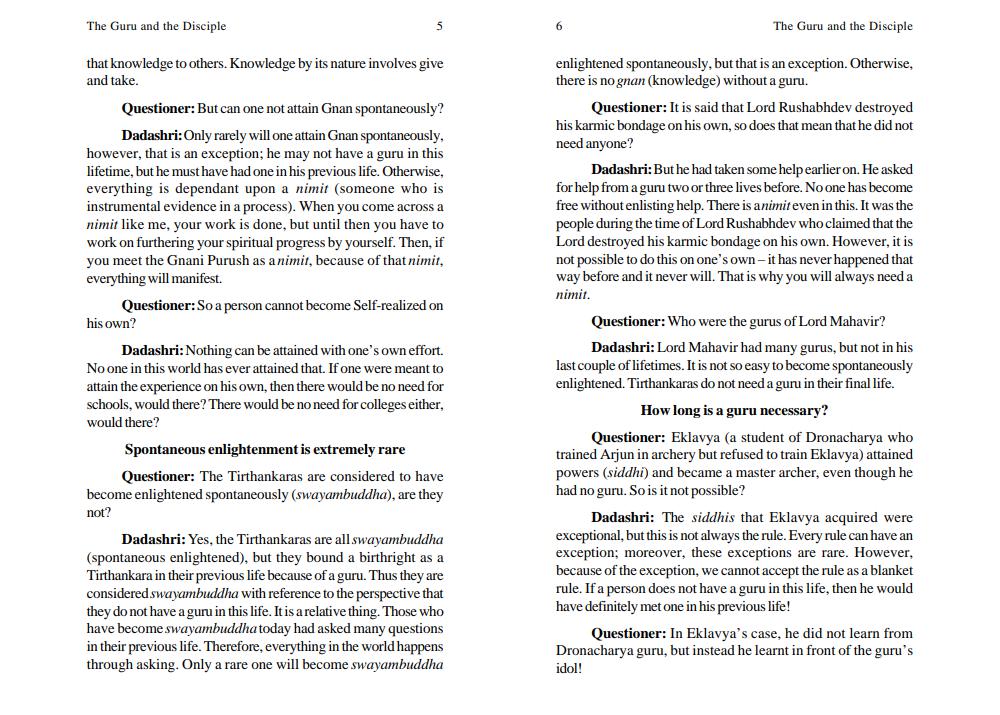Book Title: Guru and Disciple Author(s): Dada Bhagwan Publisher: Mahavideh Foundation View full book textPage 9
________________ The Guru and the Disciple The Guru and the Disciple that knowledge to others. Knowledge by its nature involves give and take. Questioner: But can one not attain Gnan spontaneously? Dadashri: Only rarely will one attain Gnan spontaneously, however, that is an exception; he may not have a guru in this lifetime, but he must have had one in his previous life. Otherwise, everything is dependant upon a nimit (someone who is instrumental evidence in a process). When you come across a nimit like me, your work is done, but until then you have to work on furthering your spiritual progress by yourself. Then, if you meet the Gnani Purush as a nimit, because of that nimit, everything will manifest. Questioner: So a person cannot become Self-realized on his own? Dadashri: Nothing can be attained with one's own effort. No one in this world has ever attained that. If one were meant to attain the experience on his own, then there would be no need for schools, would there? There would be no need for colleges either, would there? Spontaneous enlightenment is extremely rare Questioner: The Tirthankaras are considered to have become enlightened spontaneously (swayambuddha), are they not? enlightened spontaneously, but that is an exception. Otherwise, there is no gnan (knowledge) without a guru. Questioner: It is said that Lord Rushabhdev destroyed his karmic bondage on his own, so does that mean that he did not need anyone? Dadashri: But he had taken some help earlier on. He asked for help from a guru two or three lives before. No one has become free without enlisting help. There is animit even in this. It was the people during the time of Lord Rushabhdev who claimed that the Lord destroyed his karmic bondage on his own. However, it is not possible to do this on one's own- it has never happened that way before and it never will. That is why you will always need a nimit. Questioner: Who were the gurus of Lord Mahavir? Dadashri: Lord Mahavir had many gurus, but not in his last couple of lifetimes. It is not so easy to become spontaneously enlightened. Tirthankaras do not need a guru in their final life. How long is a guru necessary? Questioner: Eklavya (a student of Dronacharya who trained Arjun in archery but refused to train Eklavya) attained powers (siddhi) and became a master archer, even though he had no guru. So is it not possible? Dadashri: The siddhis that Eklavya acquired were exceptional, but this is not always the rule. Every rule can have an exception; moreover, these exceptions are rare. However, because of the exception, we cannot accept the rule as a blanket rule. If a person does not have a guru in this life, then he would have definitely met one in his previous life! Questioner: In Eklavya's case, he did not learn from Dronacharya guru, but instead he learnt in front of the guru's idol! Dadashri: Yes, the Tirthankaras are all swayambuddha (spontaneous enlightened), but they bound a birthright as a Tirthankara in their previous life because of a guru. Thus they are considered swayambuddha with reference to the perspective that they do not have a guru in this life. It is a relative thing. Those who have become swayambuddha today had asked many questions in their previous life. Therefore, everything in the world happens through asking. Only a rare one will become swayambuddhaPage Navigation
1 ... 7 8 9 10 11 12 13 14 15 16 17 18 19 20 21 22 23 24 25 26 27 28 29 30 31 32 33 34 35 36 37 38 39 40 41 42 43 44 45 46 47 48 49 50 51 52 53 54 55 56 57 58 59 60 61 62 63 64 65 66 67 68 69 70 71 72 73 74 75 76 77 78 79 80 81 82 83 84 85
